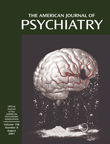To the Editor: Michael Bauer, M.D., Ph.D., et al.
(1) added to the compelling evidence that the supplementation of antidepressant treatment with lithium can enhance response in many treatment-resistant subjects with depression
(2). Among patients with major depression and no evidence of bipolar disorder or suicidality who responded poorly to antidepressants for 1 month, 41 of 75 (54.7%) recovered with open-label lithium treatment added for 8–10 weeks. Of 30 who were followed up, one withdrew consent, and 29 were randomly assigned to continue lithium therapy (N=14) or to switch to placebo (N=15); antidepressant treatment continued up to 4 months. After lithium discontinuation, seven of the 15 placebo patients (46.7%) again became ill: five of the seven (71.4%) were depressed, and two (28.6%) were manic; one (6.7%) of the 15 placebo patients committed suicide. Therefore, two of 30 previously depressed unipolar patients (6.7%) (two of 15 patients taking placebo, 13.3%) were rediagnosed as bipolar. These responses all emerged within 4 months (mean=4 weeks) after they stopped taking lithium.
Relatively rapid lithium discontinuation (1–7 days) led to a 47% risk of an early return of affective illness. Such a high early risk of depression and mania is found in many studies of major affective disorders after lithium discontinuation
(3). Some of the differences between subjects treated with lithium and placebo in study outcomes—particularly after rapid discontinuation of lithium—may include responses related to treatment withdrawal
(3). The development of mania soon after the discontinuation of lithium in previously nonbipolar depressed subjects is not widely documented, although the emergence of spontaneous or antidepressant-associated mania, hypomania, or mixed states after recurrent depression is well known
(4,
5).
Switching to mania or hypomania has been reported in 70 of 559 subjects within approximately 5.5 years (2.28/100 patient-years)
(4). However, in the study by Dr. Bauer and colleagues, the rate of switching was 70 times greater (two of 15 patients per 0.0833 year, 160/100 patient-years) in depressed patients who were unresponsive to antidepressants and who stopped taking lithium while taking antidepressants. These rediagnosed patients may have had latent bipolar disorder with an apparently unipolar course and experienced unprotected exposure to antidepressants before they stopped taking lithium. In general, subjects with depression who have been unresponsive to antidepressant therapy may have a disproportionate risk of potential bipolarity. Moreover, many of the one-third to one-half of treatment-resistant depressed subjects who respond to lithium augmentation of antidepressants (2) may derive from this latent-bipolar subgroup.
Evidently, lithium discontinuation can be dangerous for patients with unrecognized bipolar disorder, perhaps particularly among those who have been unresponsive to antidepressant treatment. We encourage 1) vigorous exploration of past and family histories of potential bipolarity in depressed subjects who are resistant to antidepressant treatment, 2) gradual tapering of lithium, and 3) special attention soon after rapid discontinuation
(3). The work by Dr. Bauer and colleagues also raises questions of how to interpret differences in drug/placebo results involving drug discontinuation, since the findings may not simply represent comparisons of treatment versus no treatment, as is often assumed
(3).

